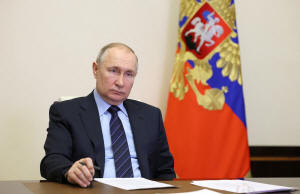Kremlin warns of more asset seizures after move against Fortum and
Uniper
 Send a link to a friend
Send a link to a friend
 [April 26, 2023]
By Alexander Marrow and Anne Kauranen [April 26, 2023]
By Alexander Marrow and Anne Kauranen
(Reuters) - The Kremlin warned on Wednesday it could seize more Western
assets in retaliation for foreign moves against Russian companies, after
taking temporary control of assets belonging to Finland's Fortum and
Germany's Uniper.
President Vladimir Putin late on Tuesday signed a decree establishing
temporary control of the Russian assets of the two European state-owned
energy firms. Energy group Fortum said it was "investigating" and Uniper,
Fortum's former subsidiary, said it was "reviewing" the move. The German
finance ministry had no immediate comment.
The decree showed Moscow had already taken action against Uniper's
Russian division Unipro and Fortum's assets. Russia made clear that the
move could be reversed.
Moscow has reacted angrily to reports that Group of Seven nations are
considering a near-total ban on exports to Russia, while many have
called for far tougher sanctions to limit Russia's ability to fight in
Ukraine.
Meanwhile, the European Union is looking at using frozen Russian assets
to rebuild Ukraine. Germany nationalised a former division of Russian
energy giant Gazprom last year.

"The decree adopted is a response to the aggressive actions of
unfriendly countries," Kremlin spokesman Dmitry Peskov said. "This
initiative mirrors the attitude of Western governments towards foreign
assets of Russian companies."
Putin's decree "does not deal with property issues and does not deprive
the owners of their assets. Because external management is temporary and
only means that the original owner no longer has the right to make
management decisions," Peskov continued.
"The main purpose of the decree is to form a compensation fund for the
possible application of reciprocal measures in response to the illegal
expropriation of Russian assets abroad."
LACK OF CLARITY
Uniper owns 83.73% of Unipro, which operates five power plants with a
total capacity of over 11 gigawatts in Russia and about 4,300 employees.
Fortum is majority-owned by Finland, which joined the NATO military
alliance early this month. Moscow said Finland had made a dangerous
mistake.
The Finnish foreign ministry would not immediately comment on how
Russia's decision would reflect on relations between the two countries.
"Fortum's current understanding is that the new decree does not affect
the title (registered ownership) of the assets and companies in Russia,"
the company said in a statement.
[to top of second column]
|

Russian President Vladimir Putin chairs
a meeting of the Presidential Council for the Local Self-Government
Development via a video link at the Novo-Ogaryovo state residence
outside Moscow, Russia April 20, 2023. Sputnik/Gavriil Grigorov/Kremlin
via REUTERS

"However, it remains unclear how this affects e.g. Fortum's Russian
operations or the ongoing divestment process," it added.
Fortum's Russia division has seven thermal power plants in the Ural
region and Western Siberia, while it also holds a portfolio of wind
and solar plants in Russia, together with local venture partners.
The book value of those assets stood at 1.7 billion euros ($1.87
billion) at the end of 2022.
Both companies have been trying to exit Russia. In February, Uniper
valued its Unipro stake at a symbolic 1 euro to reflect the
likelihood that a deal would not take place.
The decree said Russia needed to take urgent measures to respond to
unspecified actions from the United States and others it said were
"unfriendly and contrary to international law". The two entities'
shares were placed in the temporary control of Rosimushchestvo, the
federal government property agency.
State-owned Russian bank VTB this week said Russia should consider
taking over and managing the assets of foreign companies such as
Fortum, only returning them when sanctions were lifted. Fortum had
previously flagged expropriation risk.
Asset sales by investors from "unfriendly" countries - as Moscow
terms those that imposed sanctions against Russia - require approval
from a government commission and, in some cases, the president.
Moscow's move creates a new headache for companies still trying to
extricate themselves from Russia. Companies with stakes in key
energy projects and banks already face more stringent exit pathways.

Wintershall Dea, which still holds stakes in a number of Russian
joint ventures with Gazprom, called Moscow's policies
"unpredictable" and "unreliable".
($1 = 0.9094 euros)
(Additional reporting by Reuters in Moscow, Essi Lehto in Helsinki,
Anna Ringstrom in Stockholm, Christoph Steitz and Vera Eckert in
Frankfurt and David Ljunggren in Ottawa; Editing by Alex Richardson)
[© 2023 Thomson Reuters. All rights
reserved.]This material may not be published,
broadcast, rewritten or redistributed.
Thompson Reuters is solely responsible for this content. |